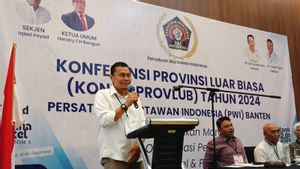JAKARTA - The advice of many parents to become civil servants (PNS) or state civil servants (ASN) seems increasingly relevant. It makes more sense because this profession is one of the most guaranteed social security. This is in contrast to the informal sector workers who are the backbone of this country.
Currently, according to the Head of the State Personnel Agency (BKN), Bima Haria Wibisana, there has been a change in the image of civil servants. In the past, this profession was considered so exclusive and needed "insiders" to be able to work there, now almost anyone can.
"In the past, they had the image that if they didn't have money, they didn't have acquaintances, they wouldn't register as civil servants. They were already discouraged before fighting. With a good system in the last 7 years, the situation has changed," Bima told VOI.
In some areas, civil servants have even become a respected and respected profession. No wonder many parents dream of their children and even their daughter-in-law as civil servants.
"In certain areas, those who become civil servants are still categorized as respected groups. That's why there are still many parents who encourage their children to become civil servants," said Bima.
Nevertheless, Bima said the number of people who wanted to become civil servants should not be too many. "The reason is that this is not a productive sector, it does not produce or does not have an impact on economic growth," said Bima.
In addition, Bima also explained that the PNS profession is not actually a job, but a profession to manage the country. He said, currently there are still differences in the public's perspective on civil servants and private employees. In contrast to some developed countries, which consider civil servants and private employees to be similar.

The number of applicants for civil servants has always been fantastic. In this year's CPNS alone, there were around 3.48 million applicants. Meanwhile, in 2020, the number of CPNS applicants reached 3.77 million people.
Indeed, if you look at the data, the profession of being a civil servant is never empty of enthusiasts. No exception for students and students. For example, a survey from the Research Team of the Center for the Study of Governance and Administrative Reform at the University of Indonesia (UI-CSGAS) noted that the majority (57 percent) of the students they surveyed wanted to become civil servants.
So what are the reasons why many people are competing to become civil servants? To answer that, the sociologist at the Sebelas Maret State University (UNS) Surakarta, Drajat Tri Kartono, has the answer.
Drajat said there are at least three reasons why the public's interest in becoming a civil servant is high. First, by becoming civil servants, they can be stable in any situation, including during the crisis due to the COVID-19 pandemic.
"Because the support from state funding is strong. The state collects taxes from all the people," said Drajat to Kompas.
Second, because the employment absorption capacity of the private industrial sector is currently not commensurate with the number of workers who are born. This is more clearly seen when many companies are laying off their workers due to the impact of the pandemic crisis.
And thirdly because of the good reputation of civil servants in the eyes of the public. No wonder civil servants usually have the nickname "dream-in-law."

Of the three reasons, the most prominent is actually the first. About the stability of the social security system. This is a factor that is difficult to find elsewhere. This is quite the opposite for those who work in the informal sector.
According to data from the Indonesian Institute of Sciences (LIPI) in 2019, it was recorded that more than half of Indonesia's population met their economic needs through the informal sector. More precisely, the independent small-scale economic sector. However, this is not accompanied by a strong social security system.
Researcher from the LIPI Population Research Center, Dewi Harwina, explained that 35 percent of Heads of Households (KRT) who are informal sector workers do not have health insurance. Meanwhile, domestic workers in the informal sector who already have health insurance have a low level of sustainability.
"61.8 percent of informal workers admit that they are in arrears in health insurance contributions due to financial aspects, and 11.2 percent are in arrears because of the low level of trust in health insurance providers," Dewi explained as quoted by the LIPI official website.
In terms of employment security, Ngadi, Researcher of the LIPI Population Research Center, said that the reach of employment security to the informal sector is still very minimal. BPJS Employment still tends to focus on the formal sector. "Only 31.2 percent of the informal sector community knows about BPJS Ketenagakerjaan." he said.
According to Ngadi, the low participation of the community in employment security is partly due to the distance from service offices that are difficult to reach, high payment fees, and the lack of cooperation with health service providers. "There needs to be optimization of socialization through technology, artistic and cultural approaches, policy innovation, and increased cooperation." concluded Ngadi.
*Read other information about ASN or read other interesting articles from Ramdan Febrian Arifin.
Other BERNASThe English, Chinese, Japanese, Arabic, and French versions are automatically generated by the AI. So there may still be inaccuracies in translating, please always see Indonesian as our main language. (system supported by DigitalSiber.id)













